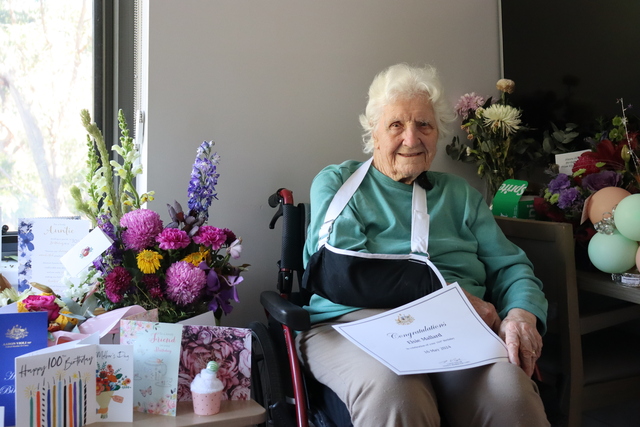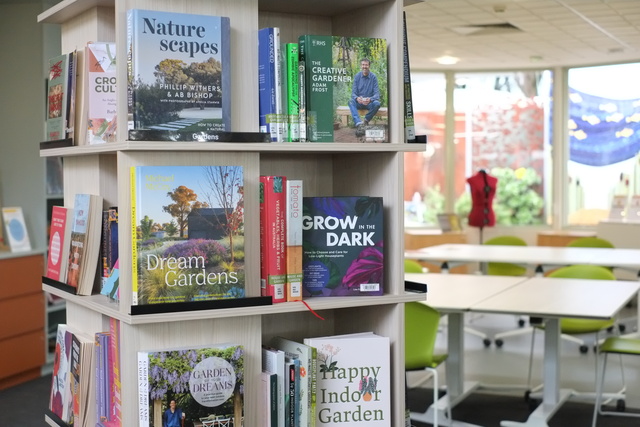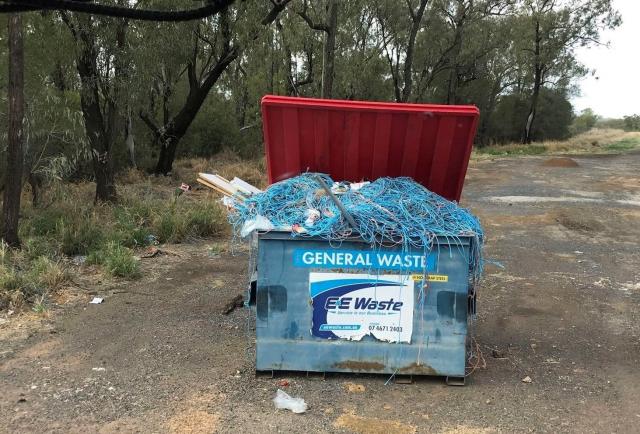Derbyshire, England, May 1920 an independent little girl was born, the third child to be welcomed into what would become a family of eight right in the depths of the post-war period.
Over a century later, that little girl remains true at heart and as independent as ever in mind and soul.
Elsie Mallard celebrated her 104th birthday on 16 May, albeit not as planned after having a fall just days before but she was determined to be well enough to share the evening with her family.
The now Mercy Place Montrose resident cherishes her sons, daughter-in-laws, grandchildren and great grandchildren, who visit as often as they can.
That connection to family has always been prevalent in Elsie’s life ever since she was a child and even more so as a teen, when, like her older brothers and sisters, she had to work to help support the family.
Her father, a coal miner, was involved in the 1926 strike but picked up work here and there for a few years.
“For a little while during the strike my dad was working on what they call outcrops gathering coal off the surface,” she said.
“In those days, I think we had more confidence in kids because it was about a mile and a half from home, and my sister and I used to take him his lunch.”
But a few years later, Elsie had to leave school to help support her family.
“When I was 11, dad came out of work, the coal mines closed down. That’s when we decided to move to Lancashire, Yorkshire to try and get work but dad didn’t get any work for six years,” Elsie said.
“My sister got work, my brother too and then I got to 14 and it was essential that I worked but I had to give my pay packet up.”
Elsie, just aged 14, worked long hours at a nearby cotton factory, something she could only describe as “hard work”.
“I worked there from quarter to seven in the morning to six o’clock at night, a Saturday morning included, 54 and three quarter hours a week.”
Elsie worked there for six years, which led into the beginning of World War II – she was 19-years-old when the war broke out.
At the age of 20, Elsie decided she wanted to be a full time officer in the Salvation Army.
In 1940, Elsie moved to London to study at the William Booth Memorial Training College.
“I slept in my bed in my bedroom once. We only had nine months training. We used to have to carry our mattress down into the basement as soon as the alarm went off and it went off every night,” she said.
“That’s what it was like for nine months, we slept in the basement.”
The bombardment of London was ferocious but Elsie’s worst memory of The Blitz was the weekend of her 21st birthday.
“My 21st birthday weekend was my last weekend with the college, I was leaving the college to go to work for the Army.
“It was the most horrendous bombing we had, it was shocking on the Saturday night. I was 21 on the Friday, this was on the Saturday, I can’t describe it.
“We got up on Sunday morning and London was just ablaze. And the college I was in, all around it there were buildings down, some still burning. It was horrendous.”
On the Sunday, Elsie said, the sergeant she was with was able to collect an old unused pram, cups and an urn to fill with boiling water.
“We walked all around, going to the bomb sites giving the men drinks, because it was only men who were fighting the fires.”
Commissioned as a lieutenant for the Salvation Army, Elsie was sent to Morpeth in north east England, where she said “it was so quiet, I slept in my own bed”.
“We wouldn’t know there was a war going on if it wasn’t for the planes going over all the time.”
Elsie spent the rest of the war posted up north, with an appointment in Birmingham, where she would live the longest out of her time in the UK – a total of 15 years.
It was in Birmingham that Elsie met the love of her life, Joe, and in giving up her officership in the Army she was able to marry him in 1947.
Welcoming three boys into the world, Elsie and Joe decided to move to Australia in 1960, “to give our three boys a better chance in life”.
They called the same Mooroolbark house home from 1964 until Elsie moved into Mercy Place, seeing the suburb change around them over the many decades.
With three grandchildren, two granddaughters who live locally and a grandson who lives in Utah, Elsie has nine great grandchildren and finds joy in spending time with her loved ones.
And for the first time in five years, since moving to America, her grandson and his four children will be visiting in June, something Elsie can’t wait to happen.
Elsie, despite being 104, still has a fire about her, with a mind as sharp as anything and a desire to remain helpful and independent.







